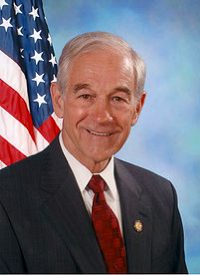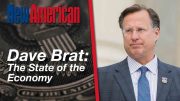
Congressman Ron Paul (R-Texas) and Senator Bernie Sanders (I-Vt.) had long worked together on their campaign for a full audit of the Federal Reserve, which emerged last year as H.R. 1207 and S. 604. Dr. Paul’s House version of the Audit the Fed bill had 319 cosponsors; Sanders’ Senate version, 32 cosponsors. Despite these bills’ massive popularity with a public grown increasingly suspicious of central banking, efforts to audit our central bank, the Federal Reserve, have been effectively thwarted for the time being.
Last-minute Senate maneuvering on Thursday May 6 resulted in a compromise measure that would require the Fed to disclose more details about its lending practices during the financial crisis, but would permit just a one-time audit of its loans and a one-time review of Fed governance. The compromise would also shield the Fed’s interest rate decision-making procedures from Goverment Accounting Office (GAO) scrutiny.
Dr. Paul, who has long advocated opening the Fed’s books to scrutiny to reveal its dealings with foreign banks as well as its domestic lending practices, expressed disappointment with the compromise in a sternly worded statement released Thursday evening.
Sanders had originally argued, “At a time when our entire financial system almost collapsed, we cannot let the Fed operate in secrecy any longer.”
Federal Reserve Chairman Ben Bernanke disagreed. The Wall Street Journal reported his remark that the original measure would “seriously threaten monetary policy independence, increase inflation fears and market interest rates, and damage economic stability and job creation.”
Members of the Obama administration, among their number former Fed officials, backed the changes to Sanders amendment. These include Treasury Secretary Timothy Geithner, former chair of the New York Federal Reserve, and Paul Volcker, who was Alan Greenspan’s predecessor as Fed chair. They gave credit to Christopher Dodd (D-Ct.), Chair of the Senate Banking Committee, for pushing through the compromise bill. Deputy Treasury Secretary Neal Wolin stated that the compromise measure would allow for a comprehensive audit of the Fed’s operations “while preserving the existing protections of the Federal Reserve’s independence with respect to monetary policy.” It is just this independence which the Fed’s critics wish to challenge, as it leaves the Fed essentially accountable to no one except other elite bankers — some of them foreign.
On Thursday night, Ron Paul made an urgent appeal in a two and a half minute video (see below) urging Senators to reject the Sanders Amendment when it comes up for a vote, possibly as soon as next Tuesday (May 11). Dr. Paul stated,
I’m not a bit surprised that the Federal Reserve got to the Senate. I had expected Bernie Sanders to offer 604, which was the same as 1207, which is Audit the Fed bill, and at the last minute he switched it and watered it down, and really it adds nothing, It’s a possibility that it even makes the current conditions worse….
But as we speak — this is Thursday night — they are working on this on the Senate floor. And we need to get as many messages as possible to as many Senators you can think of, especially to Bernie Sanders’ office, that we don’t want this version….
But the only thing that would be fair to the American people after all this work and energy that we put into this is to have an up and down vote on what was our 1207 in the House which is 604 in the Senate….
Dr. Paul’s website adds that the compromise “exempts monetary policy decisions, discount window operations, and agreements with foreign central banks from [GAO] audit. This is of particular concern when several countries such as Greece, Portugal, and Spain are seeking IMF help in the midst of their financial crises, because American taxpayers provide fully 17% of all IMF funding.”
“Taxpayers are weary of bailing out privileged banks and corporations in the U.S.,” Dr. Paul added, “and we certainly cannot afford to bail out entire countries. The possibility of this happening behind a veil of Federal Reserve secrecy is not acceptable.”
“This compromise language represents a huge missed opportunity by Congress to finally make the Fed accountable for trillions of taxpayer dollars it administers. Full transparency, via a full GAO audit, is the only acceptable option. However, I am grateful to Senator Vitter for offering the original full audit language in an alternative amendment to the bill.”
The John Birch Society has issued a press release urging opposition to the compromise measure and restoration of the original language. Readers are invited to go to “Ron Paul Appeals for Help to Rescue His ‘Audit the Fed’ Bill in the Senate” and spreading the word on social networking sites such as Twitter and Facebook.
Or they may contact their Senators directly to urge support for an amendment that would restore the original ‘Audit the Fed’ language and intent: “As Ron Paul says in the video,” reads the JBS statement, “it’s vital and urgent that we do as much as we can to bombard the Senate with information that we the people deserve to have an up-or-down vote on Audit the Fed bill.”
View Ron Paul’s complete statement below. The vote on the compromise measure is expected to take place next Tuesday, May 11.
Thumbnail photo: Ron Paul
{youtube}iuVBAMQ0j4A{/youtube



